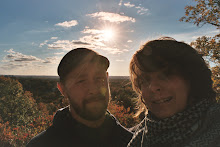Given that, where better to be than in Greece? Ancient Greeks, the Macedonians, the Romans, the Byzantines, the Ottomans. Christians, Muslims, Jews, Armenians. Oh Thessaloniki, you do not disappoint!
This weekend, ACT (the college) snagged us a free, guided trip to the Thessaloniki Archeological Museum which houses all the regional artifacts from as early as 1500 BC (don't quote exactly on that one) to about 300-400 AD when Christianity started to spread through the region in a big way.
The collection houses items that cover a wide array of Greek lives during this period. These include:

All kinds of ceramics including these receptacles that were used for burials...

These various cosmetic items (a bit shy of Mary Kay sophistication)...
 This marble slab, though resembling a tombstone, is actually the deed to a house. Others displayed announced slave ownership and the free of slaves, as well as announcements of new laws, etc. Though the Greeks have used the same alphabet from ancient times to the present, the ancient Greeks apparently didn't believe in using spaces between words or any forms of punctuation. MAKESITALITTLEHARDER
This marble slab, though resembling a tombstone, is actually the deed to a house. Others displayed announced slave ownership and the free of slaves, as well as announcements of new laws, etc. Though the Greeks have used the same alphabet from ancient times to the present, the ancient Greeks apparently didn't believe in using spaces between words or any forms of punctuation. MAKESITALITTLEHARDERFORTHEMTOFIGURE
OUTWHATTHEPURPOSEOF
THESTONEISIWOULDGUESS

Numerous statues of goddesses, gods, emperors, nobility. This one is a now-head-and-arm-less statue of Aphrodite - thus the wet toga contest winning garb...

Tile mosaics like this one that used to grace a dining room floor. The biggest of any of these pieces is about the size of a thumbnail.
 And shiny things.
And shiny things.Bronze, silver and gold jewelry and adornments, like this super, super intricate gold foil wreath
used in burying royalty. Can you imagine what a piece of work like this would cost you at Kay's Jeweler's these days?
A Note on Preservation in Thessaloniki: This city has been an important one for succeeding empires in this region for thousands of years. Each of the ones I listed above had their hands on Thessaloniki for extended periods and left their marks. BUT, each successive had a tendency to destroy the previous one's landmarks and other such artifacts that would be materially important. Additionally, up until the mid-1900s, the Greek government was fairly quick to give away building permits without regard to the historical relevance of the site. This of course, caused the loss of an unknowable amount of artifacts and landmarks. C'est la vie.
One thing the Greeks have preserved from their ancient past and molded into their Christianized calendar, is the period before Lent know in many parts of the world as Carnival. The three weeks prior to lent are cause to give in to excesses in celebration before the somber, restrictive season of lent. Without giving in to too much excess ourselves, we did go to a Carnival celebration this week in Thessaloniki. These last few "photos of the week" are of the dancers and bands that performed....













